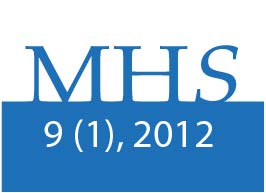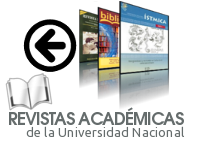Socio-emotional factors related to the academic difficulties of “star” children of the psychomotricity and intervention program
DOI:
https://doi.org/10.15359/mhs.9-1.2Keywords:
Socio-affective factors, “star” children.Abstract
This study shows the main socio- affective factors related to school difficulties of a group of three girls and three boys identified as "star" in the Programa Psicomotricidad e Intervención (Psychomotor and Intervention Program). The study was developed through a mixed methodology, in which the Human Figure Test, the Kinetic Family Drawing and an interview with the mother of each student were applied. The most important results revealed the existence of family conflicting factors that affect the emotional state of children, generating negative feelings about themselves that affect their social interactions and their school performance.
References
Centro Nacional de Diseminación de Información para Niños con Discapacidad. (2004). Hoja Informativa sobre Discapacidades, Problemas Emocionales. Washington, Estados Unidos. Recuperado desde: www.nichcy.org
Corman, L. (1967). El Test del Dibujo de la Familia. Buenos Aires, Argentina: Kapelusz.
Espinoza, G., Herrera, E., & Portugués, V. (2009). Análisis de los factores socioafectivos y pedagógicos que influyen en los procesos de aprendizaje en los niños y niñas identificados (as) como estrellas por el programa PEQUES del Centro Educativo Villalobos, en Lagunilla de Ulloa de la provincia de Heredia, Circuito Escolar 02 (Tesis para optar por el grado de Maestría en Psicopedagoía, Universidad Estatal a Distancia). San José, Costa Rica: UNED.
Estado de la Nación. (2009). Estadísticas Sociales. Educación. Recuperado desde: http://www.estadonacion.or.cr/index.php/estadisticas/costa-rica/compendio-estadistico/estadisticas-sociales
Jadue, G. (2002). Factores Psicológicos que predisponen al Bajo Rendimiento, al Fracaso y a la Deserción Escolar. Estudios Pedagógicos, (8), 193-204. https://doi.org/10.4067/s0718-07052002000100012
Jadue, G. (2003). Transformaciones Familiares en Chile: Riesgo Creciente para el Desarrollo Emocional, Psicosocial y la Educación de los Hijos. Rev. Estudios Pedagógicos, (29), 115-126. https://doi.org/10.4067/s0718-07052003000100008
Koopitz, E. (1975). El Dibujo de la Figura Humana en los Niños. Buenos Aires: Editorial Guadalupe.
Lucchini, G. (2002). Niños con Necesidades Educativas Especiales. Ediciones Universidad Católica de Chile.
Murillo, A. (2005). Normas y Procedimientos para el Manejo Técnico- Administrativo de los Servicios Educativos para Estudiantes con Problemas Emocionales y de Conducta. Centro Nacional de Recursos para la Inclusión Educativa. Ministerio de Educación Pública. San José, Costa Rica.
Piaget, J. (1995). Seis estudios de Psicología (5ed). Colombia: Grupo Editor Quinto Centenario Colombia.
Vygotsky, L. (1979). El Desarrollo de los Procesos Psicológicos Superiores. Buenos Aires, Argentina: Grijalbo.
Watson, R. (2005). Diagnóstico Educacional y Vocacional. Universidad Católica del Norte.
Woodburn, S., Fernández, H., & Boschini, C. (2007). El Diagnóstico Educativo del Fracaso Escolar: el Sistema Peques. Heredia, Costa Rica.
Downloads
Published
How to Cite
Issue
Section
License
General conditions
MHSalud: Journal in Human Movement Sciences and Health by the Universidad Nacional is cover under a Creative Commons Atribución-NoComercial-SinDerivadas 3.0 Costa Rica license.
The journal is hosted in open access repositories such as the Institutional Repository of the Universidad Nacional, the Kimuk Repository of Costa Rica and La Referencia.
The editorial source of the journal must be recognized. Use the doi identifier for this purpose.
Self-archiving policy: The journal allows the self-archiving of the articles in their peer-reviewed version, edited and approved by the Editorial Board of the Journal to be available in Open Access through the Internet. More information in the following link: https://v2.sherpa.ac.uk/id/publication/25815



















